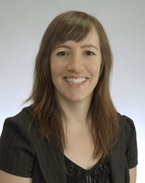Ice dynamics and glacier processes: Ginny Catania hopes her work will lead to better predictions of how ice sheets will change in the future and how those changes might impact global sea level
December 24, 2006

Ginny Catania joined the Institute for Geophysics as a research associate in September 2005.
She focuses her research on understanding ice dynamics and glacier processes in Greenland and Antarctica through remote sensing, field work, and model observations. She hopes her work will lead to better predictions of how ice sheets will change in the future and how those changes might impact global sea level.
Catania completed her first field season on a multi-year project in Greenland in spring 2006. Her goal is to study the importance of short-term ice velocity changes due to increased summer surface melt to the stability of the ice sheet interior near a site called Swiss Camp.
She is also studying ice streams in West Antarctica to try to understand what causes ice stream variability. In work published in the summer of 2006, Catania discovered that parts of Kamb Ice Stream may have shut down in as little as 10 years, much faster than glaciologists previously thought possible. Whillans Ice Stream is now slowing down and Catania hopes to better predict the future flow of Whillans based on her understanding of what happened to Kamb Ice Stream.
Catania is not only dedicated to research. She has tried to get more young women excited about a career in science. “We need all sorts of perspectives in science, from a broad range of women,” she said. She was a presenter for the Expanding Your Horizons science conference for middle school girls in Austin in March 2006. At the University of Washington, Catania mentored young women from low-income families to encourage them to enroll in college.
Now, she’s shifting her focus to women already in graduate school. She believes women studying science often don’t feel fully appreciated by their colleagues and suffer from a lack of female role models. “I think the most significant thing I can do for women in science is to be present doing good science,” she said.
Catania received her PhD. in geophysics from the University of Washington. Before coming to the Jackson School, she was a post-doctoral researcher at the University of California, Santa Cruz.
For more information about the Jackson School contact J.B. Bird at jbird@jsg.utexas.edu, 512-232-9623.
